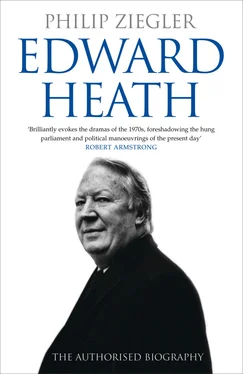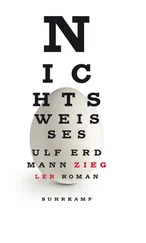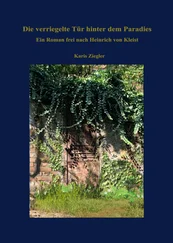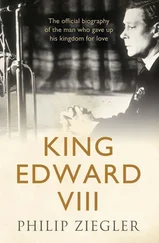SEVEN Europe: The First Round
Heath had wanted the Ministry of Labour, wrote Macmillan, ‘and it was only right, in view of all his services, that he should step into independent ministerial command’. In fact he had wanted the Board of Trade but that had been promised to Maudling. He was well satisfied with the alternative, knowing that his success or failure in the role would be critically important to the economic and social performance of the government. The history of the unions in post-war Britain suggested that this task, though difficult, would not be unmanageable. Walter Monckton in 1951 had set a pattern of conciliation which had been broadly continued by Iain Macleod; the unions for their part had been controlled by moderates who were almost as anxious to avoid confrontation as the ministers with whom they dealt. But there were signs that all might not run so smoothly in the future. On one side the Tory right wing was growing restive: strikes, though still relatively infrequent, were becoming more common. There were calls for the abolition of the closed shop and the political levy, and the introduction of secret balloting. Sir John Laing, a giant of the construction industry, wrote to the Prime Minister demanding a return to the discipline enjoyed during the Second World War and citing examples from the Continent to show that this would be generally acceptable. ‘I can see no prospect of reverting to the wartime policy of combining a prohibition of strikes with a compulsory form of arbitration on industrial disputes,’ commented Heath. ‘The industrial conditions in Switzerland are so different from ours that a comparison is not very fruitful.’ He did not rule out legislation, yet he felt that the TUC must be given a chance to put its own house in order before the Government tried to impose its will on them. 1
But, on the other side, the union leadership was becoming less disposed to take any steps which might satisfy the Tory right. The scene was still relatively tranquil. Though the stalwarts of the wartime years had now departed, the TUC was still largely in the hands of moderates. George Woodcock, the General Secretary, and his deputy, Vic Feather, were eminently reasonable or, as their left wing saw it, feeble. So were the majority of members of the General Council. When Macmillan wrote in dismay to Heath about a rumour that the TUC was proposing a boycott of South African goods – ‘There are terrible dangers, especially for the heavy machinery business. In their present mood the Union of South Africa might retaliate by boycotting mining machinery and all the rest of it’ – Heath replied soothingly that all was under control. He would talk to Tom Williamson, ‘one of the more level-headed members of the General Council’, and was sure that the TUC would show restraint. So, for the moment, it did, but with Frank Cousins in charge of the giant Transport and General Workers’ Union (TGWU) it was clear that the industrial scene was likely to grow more tempestuous. Arthur Scargill and his like were still a distant menace, but Scargill was already ensconced in his local branch of the National Union of Mineworkers (NUM) and still a member of the Young Communist League. The problems that Heath was to confront in the mid-1970s had their genesis fifteen years before. 2
Heath was genuinely well disposed towards the unions; he adhered to the view which had been propounded in One Nation , that ‘a strong and independent Trade Union movement is essential to the structure of a free society’. He set out to create a good working relationship with its leaders. Vic Feather warmed to him from the start. ‘He was ready to depart from the formal procedures and see people informally,’ Feather told Heath’s biographer, George Hutchinson. ‘He recognised that preconceived positions by the Minister are no good…He played the traditional role of being neutral…He understood the need for conciliation.’ William Carron, the president of the Amalgamated Engineering Union (AEU), was likely to prove one of the most influential players in the game. Heath asked him out to dinner. Carron opted for lunch but refused to meet Heath in a restaurant as being too public a venue. Finally they settled for the Carlton Club. Carron can hardly have found the environment congenial but at least there were no lurking journalists. The lunch was a great success and went on till 4 p.m. In December 1959 Heath asked if he could borrow Chequers for a working party on industrial relations. Macmillan’s appointments secretary thought this would be a dangerous precedent and was probably outside the designated purposes of the Chequers Trust. With benign hauteur Macmillan minuted: ‘I expect Mr Heath’s guests will be more-or-less house-trained. Please arrange.’ 3
Heath’s first few months in office were uneventful; even when a rail strike began to seem a probability it was Ernest Marples as Minister of Transport who led in Cabinet. Heath said that, since the railwaymen had refused arbitration, he would have been entitled to intervene, but he thought ‘it would be better to await developments’. The situation was complicated by the fact that the Guillebaud Committee was about to report on the issue and was certain to recommend a substantial pay increase. The 4 per cent rise on offer was therefore no more than an interim figure: two of the unions involved were prepared to accept it but the National Union of Railwaymen (NUR) stood out for an immediate 5 per cent. Heath made the disagreement between the unions an additional reason for holding his own fire but when it became clear that a national rail strike was otherwise inevitable he called in the unions and the British Transport Commission for direct talks. An element of charade was added by the fact that it was by now known to ministers that the Guillebaud Committee was going to suggest a figure far higher than the NUR was demanding (in the event it offered rises of between 8 per cent and 20 per cent). Heath argued in Cabinet that, given this, to refuse the NUR demand would present ‘difficulties from the point of view of the Minister of Labour in his conciliatory role’. Some members of the Cabinet complained that this would be a surrender to blackmail and the Chancellor muttered darkly about the dangers of inflationary settlements, but the majority was anxious to avoid a pointless and damaging strike. 4‘I am thinking of you all the time,’ cabled Macmillan from Cape Town. ‘Do not hesitate to let me know if there is anything you want me to do.’ The press reaction had been reasonable, Heath replied, ‘but there may be criticisms from some members of the Party’. 5In the event, he was considered to be the hero of the hour and those sceptics who feared the long-term effects on negotiations with the unions for the most part kept their doubts to themselves.
Heath was convinced that the time was ripe for a high-level meeting between employers and union leaders, presided over by the Prime Minister, which would open the way for a new age in industrial relations. To his dismay his Cabinet colleagues were politely unenthusiastic – the project was too ambitious, it would be dangerous to convene such a meeting until the ground had been carefully prepared and a measure of consensus established. ‘Further consideration was needed,’ concluded the Prime Minister. Undeterred, Heath battled on and by the end of July 1960 was able to tell the Cabinet that both the British Employers’ Confederation and the TUC were ready to enter into talks. He had arranged for a meeting of the Joint Consultative Committee in the near future. 6By the time it took place he had moved on, but he had launched a process which was to be carried on by his successor, John Hare. Heath’s relationship with the unions tends to be judged in the light of his performance as Prime Minister, particularly by the legislation which he championed intended to place the unions within the framework of the law. ‘In the period from 1959 to 1964,’ writes Eric Wigham, ‘the Ministry of Labour moved from the field of talk into that of action and legislation. Perhaps it began with Edward Heath, the future Prime Minister with the laughing shoulders and cold eyes.’ Cold eyes or not, Heath’s most considered views on labour relations in these earlier days were delivered at the Swinton Conservative College in May 1960. What should be done to improve industrial relations, he asked. ‘Some people would like to see the legal situation tightened up, but there is a grave danger in seeking legal solutions. How would they work in practice? What happens if thousands of men ignore the law and go on strike?…In dealing with these problems, we are dealing with the whole of the industrial population of this country. Those who think it is purely a legal affair would do well to remember that the law deals with criminal and civil cases in which one person or a small number of persons is involved. Here we are dealing with very large numbers indeed, with a long history behind their problems, and holding very deep feelings. They need to be approached very carefully, both by industry and by ourselves.’ It might have been better for Heath if he had had those words engraved and displayed permanently on his desk. 7
Читать дальше












